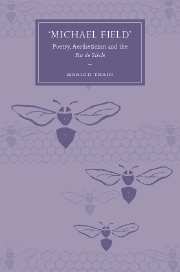Book contents
- Frontmatter
- Contents
- Acknowledgements
- Introduction: ‘something fierce, subtle, strange, singular’
- 1 The diaries and dramas: life-writing and the temporal patterns of aestheticism
- 2 Long Ago: the male pseudonym, fin-de-siècle sexualities and Sappho's historical leap
- 3 Sight and Song: Botticelli and ekphrastic paradox
- 4 Underneath the Bough: dual authorship and lyric song
- 5 Wild Honey from Various Thyme: apian aestheticism and the lyric book collection
- 6 The Catholic poetry: the spiritual and historical ‘turn’ of the century
- Conclusion: modernism and the fin de siècle
- Notes
- Bibliography of material by Katharine Bradley and Edith Cooper
- General bibliography
- Index
- CAMBRIDGE STUDIES IN NINETEENTH-CENTURY LITERATURE AND CULTURE
Conclusion: modernism and the fin de siècle
Published online by Cambridge University Press: 08 September 2009
- Frontmatter
- Contents
- Acknowledgements
- Introduction: ‘something fierce, subtle, strange, singular’
- 1 The diaries and dramas: life-writing and the temporal patterns of aestheticism
- 2 Long Ago: the male pseudonym, fin-de-siècle sexualities and Sappho's historical leap
- 3 Sight and Song: Botticelli and ekphrastic paradox
- 4 Underneath the Bough: dual authorship and lyric song
- 5 Wild Honey from Various Thyme: apian aestheticism and the lyric book collection
- 6 The Catholic poetry: the spiritual and historical ‘turn’ of the century
- Conclusion: modernism and the fin de siècle
- Notes
- Bibliography of material by Katharine Bradley and Edith Cooper
- General bibliography
- Index
- CAMBRIDGE STUDIES IN NINETEENTH-CENTURY LITERATURE AND CULTURE
Summary
I began this book by thinking of Michael ‘Field’ as an experimental field. This image of mutually influencing forces captures the essence of the dynamic underpinning Michael Field's poetry. There are many different dramas of influence played out within the space of the Michael Field signature, but, as I argued in Chapter 1, ‘Michael Field’ might ultimately be read as an interpretation of Bradley and Cooper's lives that allows their story to be mediated and shaped as it progresses. This two-way interaction between the women and Michael Field allows their story to attain a coherence usually only managed in retrospect. For example, the conclusion of their story (in the return to the Church) seems to be embedded within their interpretive framework from the beginning. In the back, lining, page of the 1907 diary, is written the following: ‘Do you know what the name “Michael” means? “one who is like God”. & we may well believe he watches over those who have that name written in their hearts’. As Frederick Roden astutely observes, ‘Approaching their end, Katherine [sic] and Edith did not distinguish the events in their lives from the passion of Christ’ – and, further, it is as if this conflation was presented as an inevitable development of the story, contained as a seed from the moment they took the name ‘Michael’ several decades ago. There is no doubt that Michael Field enables Bradley and Cooper actually to live aesthetically as well as to write aesthetically.
- Type
- Chapter
- Information
- 'Michael Field'Poetry, Aestheticism and the Fin de Siècle, pp. 201 - 215Publisher: Cambridge University PressPrint publication year: 2007



